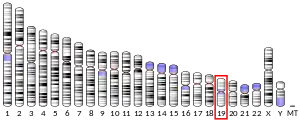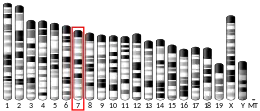RSPH6A
Radial spoke head protein 6 homolog A (RSPH6A) also known as radial spoke head-like protein 1 (RSHL1) is a protein that in humans is encoded by the RSPH6A gene.[5][6]
| RSPH6A | |||||||||||||||||||||||||||||||||||||||||||||||||||
|---|---|---|---|---|---|---|---|---|---|---|---|---|---|---|---|---|---|---|---|---|---|---|---|---|---|---|---|---|---|---|---|---|---|---|---|---|---|---|---|---|---|---|---|---|---|---|---|---|---|---|---|
| Identifiers | |||||||||||||||||||||||||||||||||||||||||||||||||||
| Aliases | RSPH6A, RSHL1, RSP4, RSP6, RSPH4B, radial spoke head 6 homolog A | ||||||||||||||||||||||||||||||||||||||||||||||||||
| External IDs | OMIM: 607548 MGI: 1927643 HomoloGene: 36476 GeneCards: RSPH6A | ||||||||||||||||||||||||||||||||||||||||||||||||||
| |||||||||||||||||||||||||||||||||||||||||||||||||||
| |||||||||||||||||||||||||||||||||||||||||||||||||||
| |||||||||||||||||||||||||||||||||||||||||||||||||||
| |||||||||||||||||||||||||||||||||||||||||||||||||||
| Wikidata | |||||||||||||||||||||||||||||||||||||||||||||||||||
| |||||||||||||||||||||||||||||||||||||||||||||||||||
Function
Radial spoke head protein 6 homolog A is similar to a sea urchin radial spoke head protein. Radial spoke protein complexes form part of the axoneme of eukaryotic flagella and are located between the axoneme's outer ring of doublet microtubules and central pair of microtubules. In Chlamydomonas, radial spoke proteins are thought to regulate the activity of dynein and the symmetry of flagellar bending patterns.[6]
Clinical significance
The RSPH6A gene maps to a region of chromosome 19 that is linked to primary ciliary dyskinesia-2 (CILD2).[6]
References
- GRCh38: Ensembl release 89: ENSG00000104941 - Ensembl, May 2017
- GRCm38: Ensembl release 89: ENSMUSG00000040866 - Ensembl, May 2017
- "Human PubMed Reference:". National Center for Biotechnology Information, U.S. National Library of Medicine.
- "Mouse PubMed Reference:". National Center for Biotechnology Information, U.S. National Library of Medicine.
- Eriksson M, Ansved T, Anvret M, Carey N (Mar 2001). "A mammalian radial spokehead-like gene, RSHL1, at the myotonic dystrophy-1 locus". Biochem Biophys Res Commun. 281 (4): 835–41. doi:10.1006/bbrc.2001.4465. PMID 11237735.
- "Entrez Gene: RSHL1 radial spokehead-like 1".
Further reading
- Maruyama K, Sugano S (1994). "Oligo-capping: a simple method to replace the cap structure of eukaryotic mRNAs with oligoribonucleotides". Gene. 138 (1–2): 171–4. doi:10.1016/0378-1119(94)90802-8. PMID 8125298.
- Suzuki Y, Yoshitomo-Nakagawa K, Maruyama K, et al. (1997). "Construction and characterization of a full length-enriched and a 5'-end-enriched cDNA library". Gene. 200 (1–2): 149–56. doi:10.1016/S0378-1119(97)00411-3. PMID 9373149.
- Hartley JL, Temple GF, Brasch MA (2001). "DNA cloning using in vitro site-specific recombination". Genome Res. 10 (11): 1788–95. doi:10.1101/gr.143000. PMC 310948. PMID 11076863.
- Wiemann S, Weil B, Wellenreuther R, et al. (2001). "Toward a catalog of human genes and proteins: sequencing and analysis of 500 novel complete protein coding human cDNAs". Genome Res. 11 (3): 422–35. doi:10.1101/gr.GR1547R. PMC 311072. PMID 11230166.
- Simpson JC, Wellenreuther R, Poustka A, et al. (2001). "Systematic subcellular localization of novel proteins identified by large-scale cDNA sequencing". EMBO Rep. 1 (3): 287–92. doi:10.1093/embo-reports/kvd058. PMC 1083732. PMID 11256614.
- Strausberg RL, Feingold EA, Grouse LH, et al. (2003). "Generation and initial analysis of more than 15,000 full-length human and mouse cDNA sequences". Proc. Natl. Acad. Sci. U.S.A. 99 (26): 16899–903. Bibcode:2002PNAS...9916899M. doi:10.1073/pnas.242603899. PMC 139241. PMID 12477932.
- Ota T, Suzuki Y, Nishikawa T, et al. (2004). "Complete sequencing and characterization of 21,243 full-length human cDNAs". Nat. Genet. 36 (1): 40–5. doi:10.1038/ng1285. PMID 14702039.
- Wiemann S, Arlt D, Huber W, et al. (2004). "From ORFeome to biology: a functional genomics pipeline". Genome Res. 14 (10B): 2136–44. doi:10.1101/gr.2576704. PMC 528930. PMID 15489336.
- Mehrle A, Rosenfelder H, Schupp I, et al. (2006). "The LIFEdb database in 2006". Nucleic Acids Res. 34 (Database issue): D415–8. doi:10.1093/nar/gkj139. PMC 1347501. PMID 16381901.
This article incorporates text from the United States National Library of Medicine, which is in the public domain.




